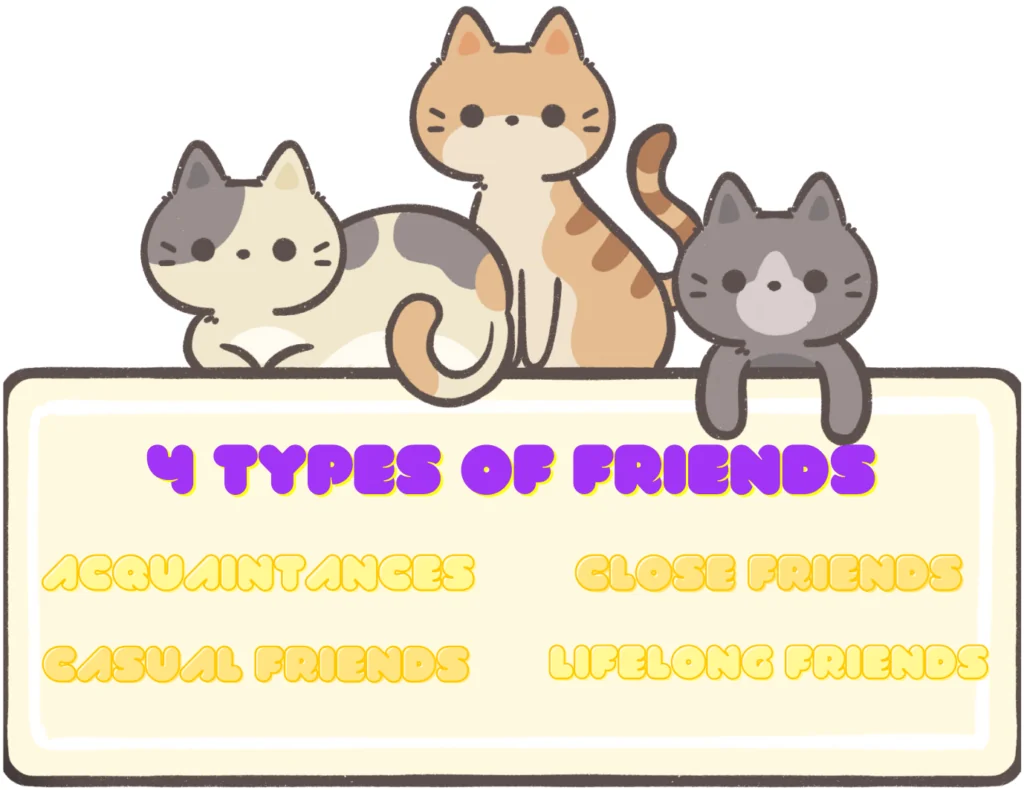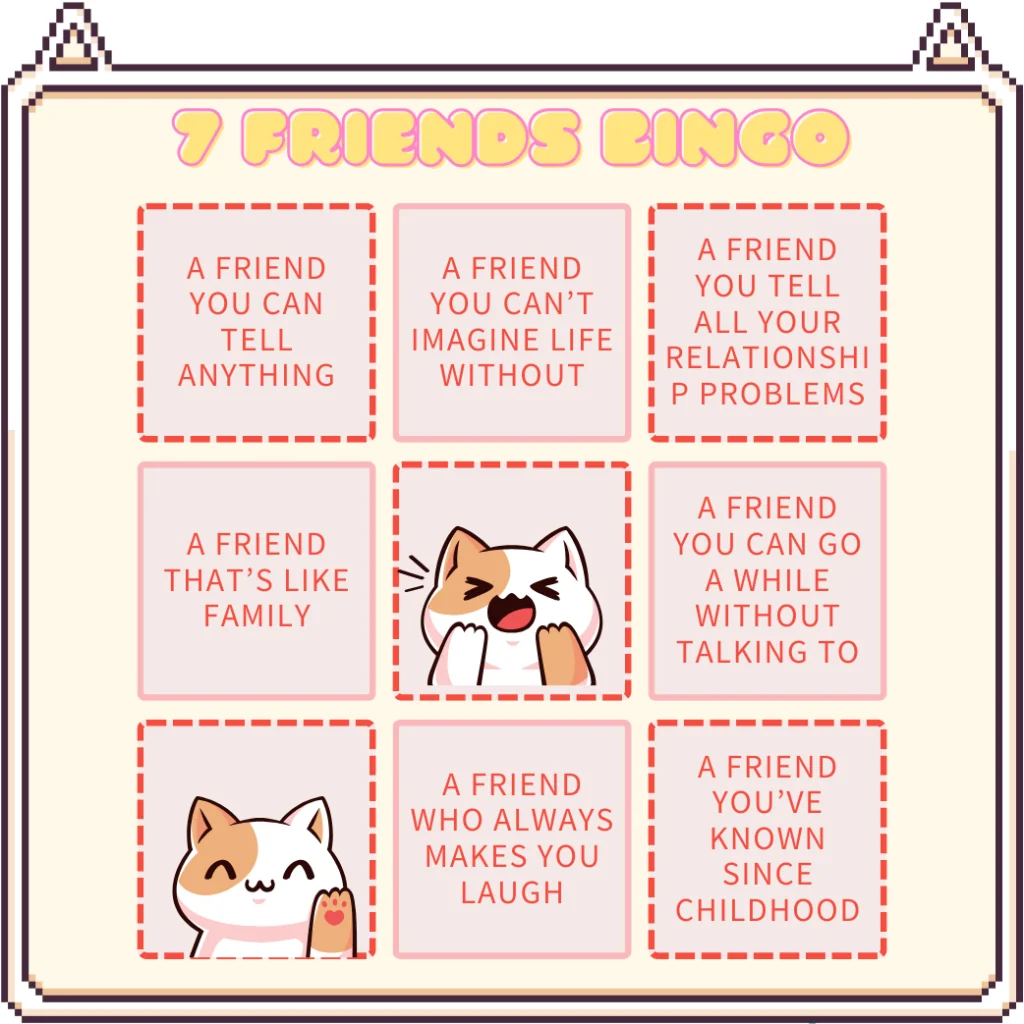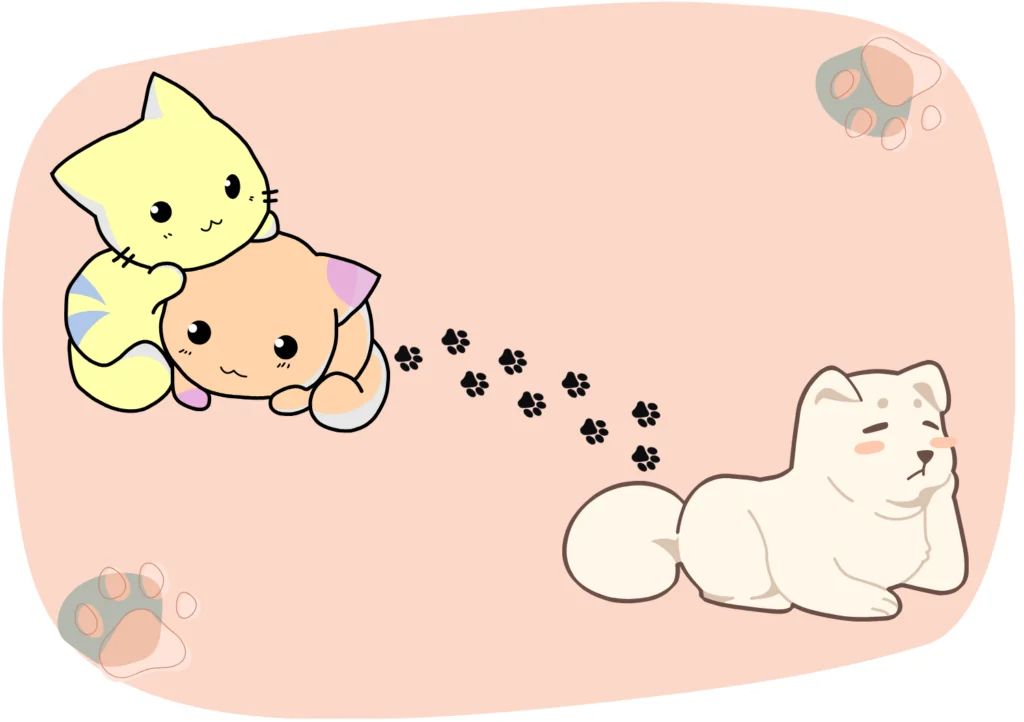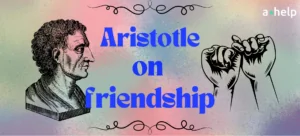Friendships play a huge role in our lives, starting from the very first connections we make with other kids on the playground. Like any relationship, they can influence our outlook on life, shape our perspective, and even change our minds. Different views on friendship have been around since the times of Ancient Greece and Rome, with philosophers like Aristotle, Socrates, and Plato pondering what it means. They each came up with their own theories on the types of friendships that exist. But we’re not diving into ancient history here. Instead, we’ll explore the various types of friendships that are often talked about in modern media. So, if you want to see how today’s sociologists and psychologists view our social circles, buckle up because you’re in for an exciting ride.

✅ AI Essay Writer ✅ AI Detector ✅ Plagchecker ✅ Paraphraser
✅ Summarizer ✅ Citation Generator
4 Friends Theory
The first theory we will look at is a more generalized division of friendships. We can say that this categorization is based on the depth of connection you have with some of your friends compared to others. Thus, according to this theory, we can divide our friends between 4 major types of friendships.
1. Acquaintances
These are the people we see at parties or know through mutual friends. We might remember their names and a few details about their lives, but we don’t have deep conversations or spend much one-on-one time with them. Acquaintances offer friendly interactions, for example a casual chat at a coffee shop or a quick “like” on social media. They can also be helpful for networking and might even share common interests with you, but the relationship stays pretty surface-level.
2. Casual Friends
Casual friends are a step up from acquaintances. These are the people we meet at the office, gym, or hobby groups. We know more about them than acquaintances because we share activities or environments regularly. Think of that coworker you grab lunch with or the buddy you always see at your yoga class. Casual friends provide companionship and fun, low-pressure interactions without the deeper emotional investment of closer friendships.
3. Close Friends
Close friends are our besties—the ones in our inner circle. These friends know our deepest secrets and support us through thick and thin. They’re our go-to people for advice, comfort, and celebrating life’s milestones. Close friends are the ones we prioritize spending time with, whether it’s grabbing coffee or planning a fun weekend trip. They offer emotional support, trust, and a lot of fun, making our lives richer and more fulfilling.
4. Lifelong Friends
Lifelong friends are those rare gems we’ve known since childhood (or at least for longer than 2-3 years). These friendships have stood the test of time, and no matter how much time passes, it feels like no time at all when we reunite. Lifelong friends share our history and have witnessed many of our life’s milestones. They offer a deep sense of belonging and timelessness, often feeling like family. These friends are keepers of our shared memories and the ones we turn to for a trip down memory lane.
It’s worth noting that even though lifelong friendships seem to be the most fulfilling, you don’t necessarily have to have them to feel content and connected within your current friend group. It might even happen that you will meet your lifelong friends at a later stage of life and quickly develop that type of “family-like” ties.
7 Types of Friends
Now let’s explore the “7 Types of Friends” theory, which breaks down friendships into seven distinct categories. This theory, popularized by TikTok, offers a fun way to think about the different roles friends can play in our lives. Here’s a look at each type:
👧 A Friend You’ve Known Since Childhood
These are your ride-or-die friends who’ve been around since you were kids. They know all your embarrassing stories and have seen you grow up. Think of them as the ones who were there for your awkward school photos and first crushes. They might not be part of your daily life now, but when you catch up, it feels like no time has passed at all.
😂A Friend Who Always Makes You Laugh
Everyone needs that friend who can turn any situation into a comedy show. Whether you’re stressed about exams or dealing with a rough day at work, this friend knows how to lift your spirits with a joke or a funny story. They’re the life of the party and always bring good vibes.
🤳 A Friend You Can Go a While Without Talking To
These friends are the low-maintenance gems. You might not talk to them every day, but when you do, you pick up right where you left off. Whether they moved to another city for college or you both got busy with life, the bond remains strong and comfortable.
🗣️ A Friend You Can Tell Anything
This friend is your confidant. You trust them with your deepest secrets, fears, and dreams. They’re the first person you call when you need advice or just someone to listen. They offer a safe space where you can be completely yourself without judgment.
🫂 A Friend That’s Like Family
Sometimes friends become like family. They’re at all your family gatherings, and your parents treat them like another child. They know all your quirks and love you unconditionally. This type of friend is there through thick and thin, almost like a sibling.
👯 A Friend You Can’t Imagine Life Without
This friend is an essential part of your life. You can’t picture going through major life events without them by your side. Whether it’s celebrating a big win or supporting you through a tough time, they’re always there, making life’s journey richer.
❤️🩹 A Friend You Tell All Your Relationship Problems
We all need that friend who’s a great listener when it comes to relationship woes. They give the best advice, or at the very least, provide a sympathetic ear. You can vent about your partner or gush about a new crush, and they’ll be there with the perfect response.
Now, this is not the only “7-friends” theory out there. You will also see the categorization that basically merges together the 4 types of friends discussed in the previous pargaraph and the theory you see above. As the result, some people might categorize their friends in the following way:
- Lifelong Friends
- Best Friends
- Close Friends
- Friends from social groups (friends of friends basically)
- Activity friends (think about your gym buddies or pottery class besties)
- Friends of Convenience (this might be the work friends or your neighbors that you regularly talk to)
- Acquaintance Friends
The Flow of Friendships
Friendships, like any other relationship, are constantly changing and evolving. An acquaintance might turn into a close friend over time, while a work colleague could become your best friend. On the flip side, just because you’ve known someone since childhood doesn’t automatically mean you’ll have a deep connection forever. Friendships need mutual support and effort to thrive.
For instance, how you connect with friends in high school or college might look very different once you’re figuring out the demands of a new career or parenthood. It’s normal for friendships to ebb and flow with life’s changes. You might have a casual friend at work who becomes a best friend as you spend more time together outside the office. Or perhaps an acquaintance you meet at a party becomes a close friend after bonding over shared interests.
Not every friendship fits neatly into a specific category, and that’s okay. What matters is embracing the unique dynamics each friendship brings. Try inviting a work friend to hang out on a weekend or take a best friend to your hobby group. You might be surprised at how these relationships can grow and change actually becoming even deeper.
Sometimes, friendships may naturally drift apart or come to an end, and that’s a normal part of life too. If you find yourself questioning a friendship, consider how you feel when you’re with that person. Do they listen to you and respect your boundaries? If the friendship feels one-sided or draining, it might be time to step back. Remember, friendly connections are meant to enrich our lives. Embrace the flow, welcome new connections, and let go when it’s time.
How Many Friends Do You Actually Need?
Friendships come in all shapes and sizes, and there’s no magic number for how many friends you need to be happy. Some people thrive with a tight-knit group of 2 or 3 close friends, while others feel content with a larger circle. The key is quality over quantity. During the pandemic, many of us felt that even having a few acquaintances brought a sense of connection and satisfaction. So, whether you have a big social network or just a couple of close pals, it’s the depth and authenticity of those connections that really matter.
For example, you might have one best friend who’s always there for deep conversations and a group of casual friends for weekend hangouts. Both types of relationships are valuable. It’s also totally normal for the number of friends you feel comfortable with to change over time. In college, you might enjoy having lots of acquaintances, but as you start a demanding job, you might prefer fewer but more meaningful friendships.
Remember, friendships require effort to maintain. Show your friends you care by checking in regularly and being there when they need you. And don’t stress about having dozens of friends—focus on building genuine connections that enrich your life. Whether it’s one or many, the right friends will stick by you.
Conclusion
You may not have all the types of friends in your social group. Maybe, a lot of your friendships just transformed from one type to another. In the other case scenario, you just may not want to categorize your finds like that. And that’s okay. You don’t necessarily have to put everything into boxes to understand and appreciate it. As long as you feel like your connection with friends fulfills you and doesn’t take anything from you (or them) then we feel that’s the type of friendship that needs to stay in your life.
FAQ
Follow us on Reddit for more insights and updates.








Comments (0)
Welcome to A*Help comments!
We’re all about debate and discussion at A*Help.
We value the diverse opinions of users, so you may find points of view that you don’t agree with. And that’s cool. However, there are certain things we’re not OK with: attempts to manipulate our data in any way, for example, or the posting of discriminative, offensive, hateful, or disparaging material.